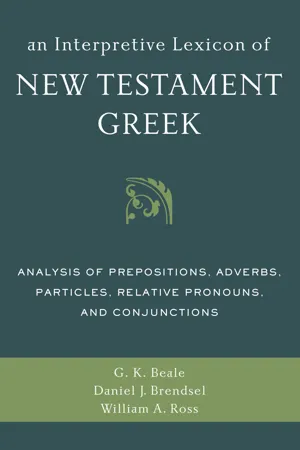
An Interpretive Lexicon of New Testament Greek
- 96 pages
- English
- ePUB (mobile friendly)
- Available on iOS & Android
An Interpretive Lexicon of New Testament Greek
About This Book
Save considerable time in translating and exegesis of the Greek New Testament text.
This Lexicon has a very specific and important purpose: to make the process of New Testament interpretation easier and more accurate by providing a comprehensive yet concise interpretation of Greek words that determine logical relationships between statements or clauses.
These words (prepositions, adverbs, particles, relative pronouns, conjunctions and other connectors) are essential to revealing and supporting the main ideas in the text and are especially useful for interpreting logical arguments, such as those found in the epistles.
While not exhaustive, this Interpretive Lexicon lists the vast majority of Greek connecting words, especially those that are notorious for being some of the most difficult words to translate.
Features include:
- Concise definitions for quick analysis.
- Examples of where the word is found in Scripture.
- Page references to several major lexical resources for further translation options and nuances.
- Interpretation of the broader categories of each word (for example: locative ( in, among, on ), means-end ( with, by ), grounds ( because, on account of ), temporal ( while, at ), and so on.
The interpretive feature of the book--evaluating the word's function in discourse--is tremendously helpful for the exegetical process, allowing the translator to closely follow the logical flow of the text with greater efficiency. This Interpretive Lexicon is a valuable handbook for student, pastor, and scholar alike.
Frequently asked questions
Information
Lexicon
ἅμα
ἄν
ἀνά
Table of contents
- Cover Page
- Title Page
- Copyright Page
- Contents
- How to Use This eBook
- Introduction
- Abbreviations
- Lexicon